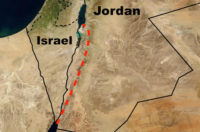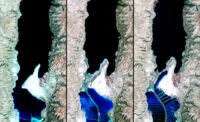The first $900-million phase of a mammoth project to pump water from the Red Sea to the shrinking Dead Sea on the Israel-Jordan border—along with boosted water and power supply facilities for the region—has attracted design-construction proposals from teams that include 17 global firms.
Israel and Jordan water agencies last year issued an international build- operate-transfer tender to prequalify firms to build a 65-million-cu-meter-per-year reverse-osmosis desalination plant and related infrastructure; a 170-kilometer pipeline for residual brine from that plant to the Dead Sea; and a hydroelectric plant to supply 20% of the desal facility’s power.
Among the companies that submitted bids, based on ENR and Israeli media reports, are Hong Kong’s Hutchison Whampoa with China’s Sinohydro and Italy’s Condotti S.r.l.; China’s CSCEC with South Korean and Japanese firms; and the Shanghai national power company alone. Lebanese firm Butec reportedly is teamed with France’s Veolia, and Egypt’s Orascom is linked with Spain’s Cobra. Other bidders include Japan’s Mitsubishi and Spain’s Abengoa. The latter firm “is recovering” from earlier financial woes, says Israel’s Globes Newspaper. “There is a lot of interest in this project at this stage, but participation will ultimately depend on the final tender,” says a source close to the process.
Officials plan to delay selecting a bid until early next year. The winning firm or consortium must create a special-purpose company to finance and execute the work, set to start in 2017 and finish by 2019. But Israeli environmentalists have warned of big risks in mixing Red Sea and Dead Sea waters and claim the pipeline will dramatically hike the cost of desalination.



Post a comment to this article
Report Abusive Comment